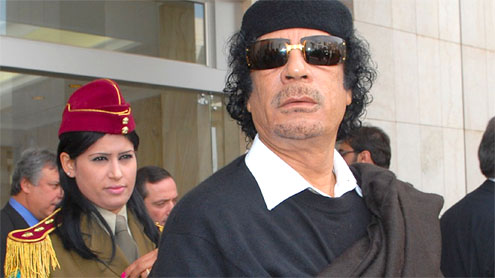 COALITION of European powers and USA along with some Arab states is now pitted against Libya in a bid to stop the repression of the opposition rebels. The current wave of uprisings in Libya’s neighbourhood, Tunisia and Egypt prompted disgruntled opposition forces to attempt to bring down the regime of Libyan strongman Muammar Gadhafi. Unlike the Tunisian and Egyptian ruling junta, Gadhafi refused to cow down and heed the opposition’s calls to step down. When opposition forces captured a few key towns, Gadhafi struck back with all his might and fury and unleashed his airpower, killing and maiming the rebels. The world initially stood by, then issued warnings to Gadhafi to stop the repression, however, when the warnings fell on deaf ears, under the auspices of UN Security Council, the international coalition launched air strikes, commencing the Libyan war in earnest. U.S. Pentagon reported that a U.S. warship fired hundreds of Tomahawk cruise missiles at Gaddafi’s air defence sites. The U.S. operation is named “Odyssey Dawn”.
COALITION of European powers and USA along with some Arab states is now pitted against Libya in a bid to stop the repression of the opposition rebels. The current wave of uprisings in Libya’s neighbourhood, Tunisia and Egypt prompted disgruntled opposition forces to attempt to bring down the regime of Libyan strongman Muammar Gadhafi. Unlike the Tunisian and Egyptian ruling junta, Gadhafi refused to cow down and heed the opposition’s calls to step down. When opposition forces captured a few key towns, Gadhafi struck back with all his might and fury and unleashed his airpower, killing and maiming the rebels. The world initially stood by, then issued warnings to Gadhafi to stop the repression, however, when the warnings fell on deaf ears, under the auspices of UN Security Council, the international coalition launched air strikes, commencing the Libyan war in earnest. U.S. Pentagon reported that a U.S. warship fired hundreds of Tomahawk cruise missiles at Gaddafi’s air defence sites. The U.S. operation is named “Odyssey Dawn”.
Countries including Canada, Denmark, Spain and Norway have sent jets to Libya, while Italy said it would permit the use of airbases such as Sigonella in Sicily and Aviano in the north to launch strikes. Ever defiant Muammar Gaddafi has struck back declaring on national television that he has started arming people in his country to fight against the ‘foreign aggression.’ The Libyan leader also said that interests of all countries involved in the attack on his country will be in danger in Libya and called their actions as the “aggression of crusaders and colonialists.”The question here arises, what is the real mission of the coalition forces? If they want to express solidarity with the rebels and execute a regime change, it is another matter but a number of independent observers believe that the west is more interested in seizing Libyan oilfields for an energy strapped world. If that is their secret agenda then it is reprehensible. Other queries pertaining to the coalition strategy are: How far is the coalition, or at least some of its members, prepared to go to effect regime change and manage the consequences following regime change? How many resources are they prepared to provide and how long are they prepared to fight? It should be remembered that in Iraq and Afghanistan the occupation became the heart of the war, and regime change was merely the opening act. It is possible that the coalition partners haven’t decided on the strategy yet, or may not be in agreement, but how far they are prepared to go in pursuit of the mission?
Surprise was not the element in question here because of continuous overt warnings to Gadhafi. Let us look at the options of attack.The first attacks are decapitation attacks designed to destroy or isolate the national command structure. These may also include strikes designed to kill leaders such as Gadhafi and his sons or other senior leaders. These attacks depend on specific intelligence on facilities, including communications, planning and so on along with detailed information on the location of the leadership. Attacks on buildings are carried out from the air but not particularly with cruise missile because they are especially accurate if the targets are slow, and buildings aren’t going anywhere. At the same time, aircraft are orbiting out of range of air defences awaiting information on more mobile targets and if such is forthcoming, they come into range and fire appropriate munitions at the target. Now perhaps the end of the war in Libya will depend on Gadhafi, how seen he capitulates. Then the question will arise regarding his successor. If the coalition installs a puppet regime like it did in Iraq and Afghanistan, then the people of Libya would be the losers. Time will tell how the new annals in history unfold. However, action against Libya smacks of double standards since the Palestinians and Kashmiris are being repressed by Israel and India for more than six decades but little or no action has been taken to free them of bondage and slavery. – Dailymailnews











